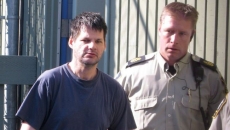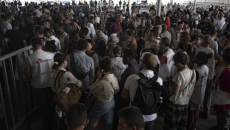The leaders of Canada and the European Union wrapped up a two-day summit in Newfoundland on Friday with a flurry of partnership announcements on green energy, raw minerals and research funding.
Substantive negotiations are complete surrounding Canada's bid to join Horizon Europe, the EU's $100-billion scientific research program, the two parties said in a joint statement on Friday. They are working toward a "prompt signature and implementation" of an official deal, the statement said.
"The association of Canada to Horizon is the deepest form of research and innovation collaboration that we can offer," European Commission President Ursula von der Leyen told reporters after the summit's closing speeches.
Canadian researchers and organizations can receive Horizon Europe funding "on equal terms" with their EU colleagues, and they will have access to the "huge, multinational networks" of researchers through the program, she added.
Research and innovation were top of mind at today’s Canada-EU Summit – so stopping by @Genesis_Centre with @CharlesMichel and @vonderLeyen made perfect sense. To all of the innovators and entrepreneurs we met: Thank you. Keep leading the way with your talent and your ideas. pic.twitter.com/2NZcy6DWu0
— Justin Trudeau (@JustinTrudeau) November 24, 2023
Prime Minister Justin Trudeau said at a press conference on Friday that the development is an "exciting articulation of what have been long-standing partnerships between scientists on both sides of the Atlantic."
Declarations about the close ties between the two regions permeated the summit, which brought European Council President Charles Michel and von der Leyen to Newfoundland and Labrador's capital city of St. John's.
The agenda for today’s Canada-EU Summit was packed – @CharlesMichel, @vonderLeyen, and I spoke about building clean economies, fighting climate change, creating good jobs, and so much more. We wrapped up knowing this: We’ll continue to work together for Canadians and Europeans. pic.twitter.com/e3vqnI4kdi
— Justin Trudeau (@JustinTrudeau) November 24, 2023
Trudeau described Canadians and Europeans as "some of the best of friends in the world," during his opening remarks on Thursday night.
He announced that Canada has worked out a deal to build water bombers and ship them to the EU, after both regions faced devastating forest fires this past summer.
Canada and the EU also announced what they are calling a new Green Alliance, which is focused on deepening existing partnerships on fighting climate change, halting biodiversity loss and intensifying technological and scientific co-operation.
And the EU leaders pledged to further collaborate with Canada on critical minerals, as allied countries seek components used in goods such as electrical vehicles from places other than China.
Von der Leyen noted that Canada is the only country in the Western Hemisphere with all the raw materials required for lithium batteries, and she invited Canada to join the EU's "critical raw materials club," which is set to be launched at the COP28 climate conference in Dubai later this month.
But Roger Hilton, a research fellow at Globsec, a security and sustainability think-tank based in Bratislava, warned that the friendship on abundant display in St. John's may not be present at the next EU-Canada Summit in 2025.
"Cracks in Europe's defence against far-right politics are starting to be exposed," Hilton said in an email, pointing to several recent election victories for populist, far-right leaders in EU countries, including the Netherlands and Slovakia.
Hilton cautioned that elections scheduled next year for a new European Parliament could result in a European Union that is more protectionist and less globally focused.
There is also a looming possibility that Donald Trump could win back the United States presidency, Hilton added.
Trump's election in 2016 forced Canada and the EU to lean on one another "to stabilize shocks to the international system," but if Trump wins next year with a less liberal EU in place, Ottawa may not have that comfort any longer, he said.
Trudeau also acknowledged the rise of "right-wing rhetoric" in the U.S. and in "certain corners" of Europe, as he railed against Conservative Leader Pierre Poilievre, accusing him of turning his back on Ukraine as it battles ongoing attacks from Russia.
The Conservatives recently voted against a bill to implement an update to Canada's free trade agreement with Ukraine, and Poilievre has insisted they did so because the legislation promotes carbon pricing. Ukraine has had a price on carbon for years and the country's ambassador is urging Canada to pass the legislation.
Canada and the EU reaffirmed their commitment to supporting Ukraine on Friday, with Trudeau announcing donations of additional small arms and ammunition to the country worth almost $60 million, as part of a $500-million military aid package announced in the summer.
With a temporary truce in the Israel-Hamas war underway to allow for the release of hostages, a group of about two dozen pro-Palestinian protesters maintained a presence outside the venue where the summit was held on Friday.
A similar number had gathered outside the small St. John's pub where Trudeau welcomed the leaders on Thursday night, chanting: "Ceasefire now!"
The leaders' joint statement fell short of calling for a permanent end to the violence, however, instead reiterating both parties' support for "humanitarian pauses" in the Gaza Strip, where Israel is waging war against Hamas following its early October attacks on Israel.
"We support Israel’s right to defend itself, in accordance with international law and international humanitarian law," the statement said.
"We strongly reiterate the importance of urgent and unimpeded access for life-saving humanitarian aid flowing to Gaza through all necessary measures, including humanitarian corridors and pauses."






